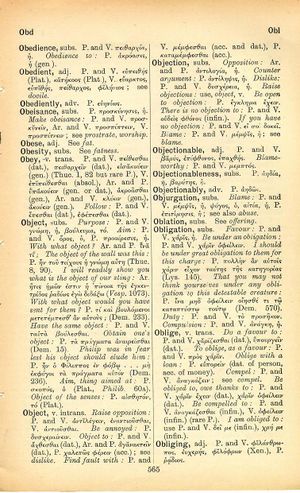object
Οὐκ ἔστι σοφίας κτῆμα τιμιώτερον → Haud ulla res pretiosior sapientia → Die Weisheit ist Besitz von allergrößtem Wert
English > Greek (Woodhouse)
subs.
Purpose: P. and V. γνώμη, ἡ. βούλευμα, τό. Aim: P. and V. ὅρος, ὁ, P. προαίρεσις, ἡ. With what object? Ar. and P. ἵνα τί; The object of the wall was this: P. ἦν τοῦ τείχους ἡ γνώμη αὕτη (Thuc. 8, 90). I will readily show you what is the object of our sting: Ar. ἥτις ἡμῶν ἐστιν ἡ ʼπίνοια τῆς ἐγκεντρίδος ῥᾳδίως ἐγὼ διδάξω (Vesp. 1073). With what object would you have sent for them? P. τί καὶ βουλόμενοι μετεπέμπεσθʼ ἂν αὐτούς; (Dem. 233). Have the same object: P. and V. ταὐτὰ βούλεσθαι. Obtain one's object: P. τὰ πράγματα ἀναιρεῖσθαι (Dem. 15). Philip was in fear lest his object should elude him: P. ἦν ὁ Φίλιππος ἐν φόβῳ . . . μὴ ἐκφύγοι τὰ πράγματα αὐτόν (Dem. 236). Aim, thing aimed at: P. σκοπός, ὁ (Plat., Philib. 60A). Object of the senses: P. αἰσθητόν, τό (Plat.). v. intrans. Raise opposition: P. and V. ἀντιλέγειν, ἐναντιοῦσθαι, V. ἀντιοῦσθαι. Be annoyed: P. δυσχεραίνειν. Object to: P. and V. ἄχθεσθαι (dat.), Ar. and P. ἀγανακτεῖν (dat.), P. χαλεπῶς φέρειν (acc.); see dislike. Find fault with: P. and V. μέμφεσθαι (acc. and dat.). P. καταμέμφεσθαι (acc.).

